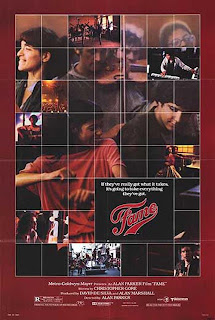A soaring experience unlike anything you've seen before.
 Of the five Alan Parker films I hadn't seen, Birdy was one I was pretty excited for. After five great movies he was on a roll and Birdy had always intrigued me ever since I was a young boy. I remember seeing the VHS cover on the shelves of my local video store all those years ago. The cover was intriguing and at the time I was a big fan of Matthew Modine. But up until last night I had never had the chance to see it.
Of the five Alan Parker films I hadn't seen, Birdy was one I was pretty excited for. After five great movies he was on a roll and Birdy had always intrigued me ever since I was a young boy. I remember seeing the VHS cover on the shelves of my local video store all those years ago. The cover was intriguing and at the time I was a big fan of Matthew Modine. But up until last night I had never had the chance to see it.So far Parker's track record had been rather exemplary. Of his first four films (Not including Bugsy Malone and his TV work) three of them were exceptional and the fourth while not as good was still a very good movie, and all four films were drastically different from one another. Sir Alan was on a roll and the question left wanting was what would he do next? The answer came in 1984 with Birdy.
Birdy is about two friends who are having troubles since their return from Vietnam. One of them suffers from the delusion that he has become a bird. It stars the aforementioned Matthew Modine and a young Nicholas Cage. There are moments at the beginning that are humorous but the film is a fairly heavy drama and is more akin to Midnight Express than any of Parker's previous films but is still unique in its own way.
It is also not as good as his previous films. There are some great moments in the film; moments that are either beautiful. emotional, powerful or all three at once. There are some great set pieces and the cinematography is extraordinary. But there are many things that don't work as well as they should and moments that don't ring as true as they should. Like the whole opening sequence which felt a little forced at times and comes of as false.
The dialogue, while quite good at some parts, is pretty bad at others. Scenes between Cage and Modine's doctor come off stilted at times and on the rare occasion don't end up making much sense. After almost 30 years of acting, Cage can be classed in two lights. One light casts the image of a well respected and highly talented actor. The other, and the more popular of the two, casts the light that he is a generic go to guy who'll take anything for a paycheck. In this film he comes off as both; in some scenes he is fantastic, in others less than convincing.
I'm a pretty big Peter Gabriel fan and when I saw his name in the credits I got rather excited. Sadly, the score he ended up composing was slightly disappointing. Don't get me wrong, there are moments that are pure Gabriel and are great but there are also moments that almost make me cringe. These moments are so overwhelmingly 80's cheese. You know, that quintessential 80's sound that hasn't aged well and has no place in modern society. You know, the really bad 80's that has mostly disappeared from today's airwaves. There are very few of those cringeworthy cues but enough of them to be distracted and all the more disappointing that Peter Gabriel wrote them.
The cinematography is, like I said, gorgeous and the editing has a great momentum to it, keeping the audience interested for the entire two hour run time. The film could of been trimmed for time here and there but in general it didn't feel very long. The war scenes in Birdy looked convincing but they could of been bigger and more grandios. Maybe it was the budget constraints that didn't allow for it but they should of shown more of the hell that was Nam. It would of made for a stronger effect than the end product.
There are some heavily emotional scenes that are rather affecting but they are few and far between and represent individual moments rather than the characters. The story itself is rather un-effecting,; interesting but un-effecting and yet should of been powerful and draining and potentially emotionally crippling. The ending too comes out of nowhere and all of a sudden the credits are rolling. Parker tends to just end his films like that, suddenly but it usually works. Here it's just abrupt and leaves you wanting more.
Overall though, Birdy stills comes off as a recommendation. Parker does a decent job keeping the film interesting, even through the hammy acting, the outdated music and the weak dialogue. One jarring aspect is a narrative track that appears out of nowhere and then fades into obscurity throughout the film. Parker let his game slip here and while he made a decent film it just doesn't compare to his pervious works. It's a worthwhile film to watch and it will keep you enthralled but it won't stay with you very long after it finishes. In a word: Worthwhile.
Film Rating: 71%
Breakdown (How Birdy scored 71%):
Production Design: 7 out of 10
Cinematography: 9 out of 10
Re-playability: 5 out of 10
Originality: 8 out of 10
Costumes: 8 out of 10
Directing: 7 out of 10
Editing: 8 out of 10
Acting: 7 out of 10
Music: 6 out of 10








